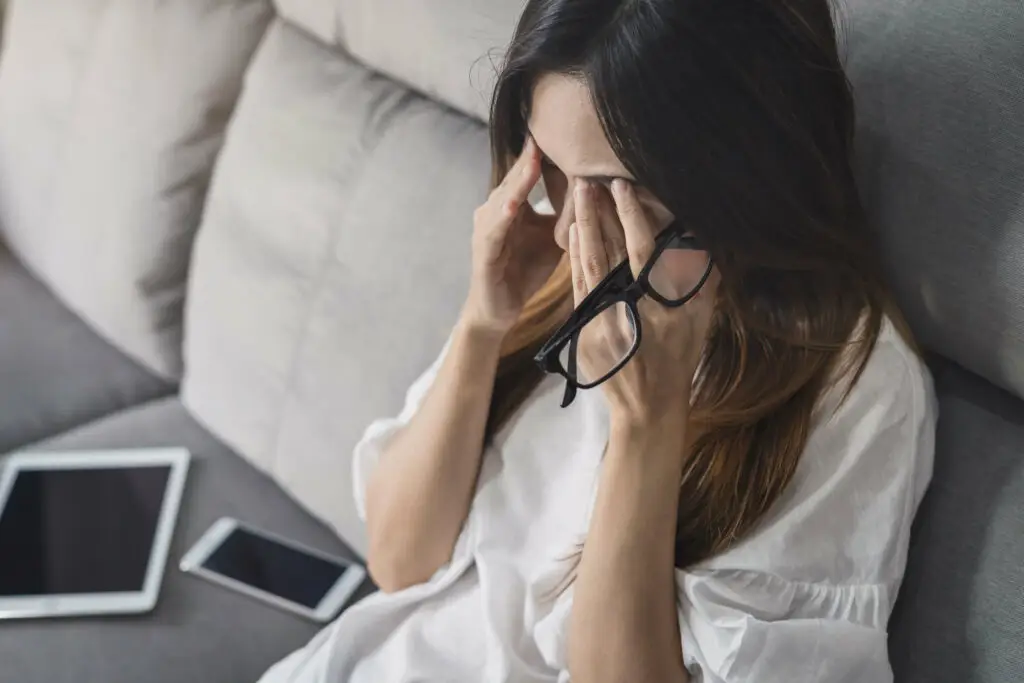Depression can make getting out of bed feel like an impossible task. When you feel like even the simplest of tasks is too much for you on days when your depression symptoms are intense, taking care of your hygiene often takes a back seat to other daily tasks.
Basic hygiene tasks—like brushing your teeth, showering, or changing clothes—can be overwhelmingly difficult on your most challenging days. You might find yourself neglecting personal care, not out of choice. The mental and physical effort feels impossible with your depression symptoms.
This challenge is often referred to as “hygiene indifference.”
This article is here to help you understand the connection between depression and hygiene, recognize the signs of hygiene indifference, and explore practical steps to reclaim your self-care routine, even on the most challenging days.
Recognizing the symptoms of hygiene indifference
Hygiene indifference is more than skipping a shower now and then—it’s a more persistent issue that can have significant consequences on your physical and mental health.
Here are some signs that you might be dealing with hygiene indifference:
- Infrequent showering or bathing: Going days or weeks without bathing can indicate hygiene indifference.
- Neglecting oral care: Forgetting or avoiding brushing your teeth regularly.
- Wearing the same clothes for extended periods: If changing clothes feels too difficult, this could be a sign of hygiene indifference.
- Avoiding grooming tasks: Letting tasks like shaving, hair care, or nail trimming slide for long periods.
- Physical discomfort: Experiencing discomfort or noticing a physical decline due to lack of hygiene, such as skin issues or bad breath.

The impact of depression on hygiene
Depression affects more than your mood—it can impact nearly every aspect of your life, including your ability to take care of yourself. Hygiene indifference can create a vicious cycle: neglecting your hygiene can make you feel worse, both physically and mentally, which in turn can deepen your depression.
Poor hygiene due to depression can have significant effects on both physical and mental health, as well as social and emotional wellness. Here’s a breakdown of the critical effects:
Physical health effects
- Increased risk of illness: Poor hygiene, such as infrequent bathing or not washing hands, can lead to an accumulation of bacteria and germs on the skin, increasing the risk of infections, including skin infections, urinary tract infections, and gastrointestinal illnesses.
- Dental problems: Neglecting oral hygiene, such as not brushing your teeth regularly, can lead to dental issues like cavities, gum disease, bad breath, and even tooth loss over time.
- Body odor: Lack of regular bathing or changing clothes can result in body odor, which can be unpleasant and noticeable to others, potentially leading to social isolation.
- Skin conditions: Failing to cleanse the skin regularly can cause skin conditions such as acne, rashes, or fungal infections. Accumulated dirt and oils can clog pores and lead to breakouts or exacerbate existing skin issues.
- Weakened immune system: Chronic poor hygiene can strain the body’s immune system, making it harder to fight off infections and recover from illnesses.
Mental and emotional health effects
- Increased depression symptoms: Poor hygiene can exacerbate feelings of worthlessness, hopelessness, and self-neglect, deepening the cycle of depression. Seeing yourself in a neglected state can reinforce negative self-perception.
- Lowered self-esteem: As personal hygiene deteriorates, self-esteem can take a hit. Feeling unclean or noticing others’ reactions to poor hygiene can make you feel ashamed or embarrassed, further reducing your motivation to care for yourself.
- Anxiety and stress: Worrying about others noticing poor hygiene or feeling self-conscious in social situations can increase anxiety and stress, making it harder to engage in social activities.
Social and relationship effects
- Social isolation: Poor hygiene can lead to social withdrawal, either because you feel too embarrassed to be around others or because others distance themselves due to discomfort with appearance or odor.
- Strained relationships: Family members, friends, or coworkers may struggle to understand the reasons behind poor hygiene, leading to strained relationships. This can create a sense of isolation or misunderstanding, further impacting your mental health.
- Work and school challenges: Poor hygiene can affect how others perceive and interact with you in a professional or academic setting. It can impact job performance, lead to discrimination or exclusion, and even jeopardize employment or academic success.
Overall health
- Loss of routine: Poor hygiene is often a sign that daily routines are breaking down. This can lead to a chaotic or unstructured life, making it harder to manage other aspects of your overall wellness, such as eating regularly, getting enough sleep, or staying physically active.
- Loss of motivation: The energy and motivation to care for yourself are often diminished by depression. As hygiene habits decline, this can reinforce a sense of helplessness or resignation, making it even more challenging to take the steps needed to improve mental and physical health.
The importance of addressing hygiene issues
It’s essential to recognize that poor hygiene due to depression is a symptom of the condition, not a reflection of personal failure. Addressing hygiene issues can be a critical part of managing depression, as improving self-care can help break the cycle of unhealthy emotions, improve physical health, and rebuild confidence and self-esteem.
Online depression therapy at Makin Wellness can provide strategies to help manage depression and its effects, including hygiene indifference. By working with your online therapist, you can develop personalized routines and coping mechanisms to improve your hygiene, even during periods of severe depression.

How to create an easy hygiene routine
Creating a hygiene routine that works even when your depression symptoms are intense is entirely impossible. The key is to start small and build from there, making tasks as manageable as possible.
- Start with the basics.
- Brushing your teeth: If brushing feels like too much, start with just rinsing your mouth with mouthwash. Aim to brush once daily, even if only for a minute or two.
- Showering: If showering feels overwhelming, wash your face or hands. Aim for a quick shower when ready—no need for an entire grooming session.
- Change your clothes: Simply changing into clean clothes can help you feel refreshed, even if you don’t have the energy for a complete hygiene routine.
- Create high/low goals: Decide ahead of time what your high-ability and low-ability goals are. This strategy allows for a fluctuation between days when symptoms are better and when they may be more difficult. High/low goals help you achieve your goals of completing a hygiene routine without striving for perfectionism or feeling guilt on your hard days and can help you to feel successful regardless of your symptom severity.
- Simplify your routine
- Dry shampoo: If washing your hair feels too difficult, dry shampoo can be a quick fix to help you feel cleaner.
- Pre-packaged wipes: Keep face or body wipes on hand for a quick cleanse when you find it difficult to muster the energy for a complete wash.
- Keep essentials nearby: Place items like toothbrushes, deodorant, and wipes within easy reach to reduce the effort needed to use them.
- Set small, achievable goals.
- Start with one task: Pick one hygiene task to focus on each day. Whether brushing your teeth or washing your face, completing one task can help build momentum.
- Use reminders: Set alarms or use sticky notes as reminders to complete basic hygiene tasks. Seeing a reminder can help prompt you to take action, even when motivation is low.
- Reward yourself: Give yourself credit for completing even the most minor tasks. Recognize that each step you take is a victory.
- Establish a routine
- Create a schedule: Try to perform hygiene tasks at the same time each day to build a routine. Consistency can make these tasks feel more manageable over time.
- Make it a ritual: Turn hygiene tasks into a calming ritual using products you enjoy, like a favorite soap or toothpaste. Making the experience pleasant can motivate you to keep up with it.
Questionnaire: Are you struggling with hygiene indifference?
If you’re unsure whether hygiene indifference is affecting you, this quick questionnaire can help you assess your situation:
- Do you find it difficult to shower or bathe regularly?
- Have you gone more than a day or two without brushing your teeth?
- Do you avoid grooming tasks like hair care or shaving?
- Do you often wear the same clothes for several days in a row?
- Have you noticed physical discomfort or health issues due to poor hygiene?
- Does the thought of completing hygiene tasks feel overwhelming or pointless?
If you answered “yes” to several of these questions, you may be experiencing hygiene indifference related to depression. Understanding this is an essential step toward finding the support and strategies you need to manage your depression symptoms and hygiene routine, even on tough days.

Tips and tricks to overcome hygiene indifference
Here are some additional tips and tricks that can help you manage your hygiene routine:
- Break tasks into smaller steps: Instead of thinking of showering as one big task, break it down into smaller steps like turning on the water, stepping in, and washing just one part of your body.
- Use timers: Set a timer for 5 minutes to start a hygiene task. Getting started is the most challenging part; once you begin, you may find it easier to continue.
- Ask for support: If you’re comfortable, ask a friend or loved one to check in with you about your hygiene routine. Sometimes, a little encouragement can make a big difference.
- Focus on the outcome: Remind yourself of how good you’ll feel after completing a hygiene task. Focusing on the positive outcome can motivate you to take action.
- Be kind to yourself: Completing only one or two of your hygiene tasks today is okay. Celebrate the small victories and be gentle with yourself. You are a work in progress, and all progress is a big deal.
Do you need more support?
If you’re struggling with depression and hygiene indifference, online therapy can be a valuable tool in helping you regain control over your self-care routine. Makin Wellness offers online therapy services tailored to your specific needs, providing support that’s accessible and convenient.
At Makin Wellness, our compassionate online therapists understand the challenges of depression and hygiene indifference. We’re here to help you navigate these challenges and support you in building a routine that works, even on the hardest days.
Conclusion: Reclaiming your self-care routine
Living with depression can make essential self-care feel like an impossible task. It’s important to remember that support is available when you are ready for it. There are steps you can take to regain control.
By understanding the impact of depression on hygiene, recognizing the signs of hygiene indifference, and implementing small, manageable routines, you can start to take care of yourself again, one step at a time.
Whether you’re just beginning to address hygiene indifference or seeking additional support, Makin Wellness is here to help. Our online depression therapy services are designed to meet you where you are, providing the tools and guidance you need to improve your mental health and take care of yourself with compassion and care.
Take the first step today by calling us at (833)-274-heal or scheduling an online therapy session, and start reclaiming your hygiene routine.








